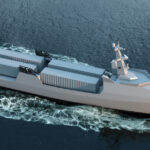
The Defense Department this week said it has awarded $193.8 million in new projects aimed at quickly fielding new technologies to warfighters, the second tranche of fiscal year 2024 awards under the Accelerate the Procurement and Fielding of Innovative Technologies (APFIT) program. “Thanks to congressional support for APFIT in this year’s defense appropriation bill, R&E is accelerating the fielding of crucial capabilities to our warfighters, Heidi Shyu, under secretary of defense for research and engineering (R&E), said in a statement.…

 By
By 










